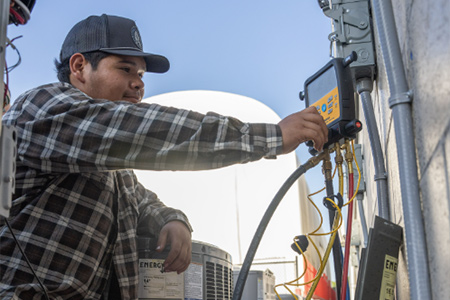
The Air Conditioning, Heating and Refrigeration concentration, commonly referred to as HVAC, prepares graduates (AAS degree or certificate of completion) to enter the workforce as an entry-level service technician, installer, or maintenance technician.
This involves a personal journey into learning and understanding how A/C, Heating and Refrigeration equipment is designed to operate, how electrical motors operate using both electricity and magnetism, how controls are used to regulate the temperature, humidity, the introduction of fresh air, and the exhaust of stale air, how protection devices are used to protect expensive and vulnerable components how to troubleshoot problems, following a specific process, using a variety of meters and test instruments, how to design, install and commission a residential HVAC and duct system.
The Air Conditioning, Heating and Refrigeration program teaches students the theory of refrigeration, principles of electricity, various gas and electrical laws, and how to safely use common tools of the trade to evaluate, maintain, and repair HVAC equipment.
Students will learn how to:
- Identify refrigeration components; explain operation of the basic refrigeration cycle and heat transfer; and demonstrate proper application and/or use of tools, test equipment, and safety procedures.
- Demonstrate knowledge of basic principles of electricity, electrical current, circuitry, and air conditioning devices; apply Ohm’s law to electrical calculations; perform electrical continuity, voltage, and current tests with appropriate meters; and demonstrate electrical safety.
- Demonstrate an understanding of the basic principles of electricity, electrical current, circuitry, and air conditioning devices; apply Ohm’s law to electrical calculations; perform electrical continuity, voltage, and current tests with appropriate meters; and demonstrate electrical safety.
- Identify attitudes and values that contribute to effective work habits; demonstrate how to work as part of a team; exhibit business etiquette, workplace civility, and ethics; and identify appropriate workplace attire.
- Utilize knowledge and understanding to accurately diagnose problems with Air Conditioning, Heating, refrigeration, and indoor air quality equipment using gauges, digital multimeters, ammeters, monitors and other tools.
- Effectively communicate an accurate diagnosis to clients without using technical jargon, demonstrate the ability to make recommendations for maintenance, repairs, accessories, and equipment replacement.

